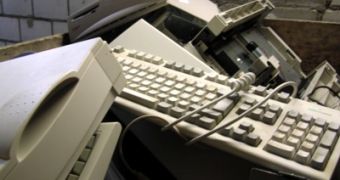Switching from a Windows-operated computer to a Linux-operated one can reduce computer-generated e-waste levels by 50%, as a government report informs.
In late 2004, an UK government study reported that running a Linux distribution instead of Microsoft's Windows on one's computer can bring some significant green benefits. The report called "Office of Government Commerce: Open Source Software Trials in Government - Final Report" stated: "A typical hardware refresh period for Microsoft Windows is 3-4 years. A major UK manufacturing organisation quotes its hardware refresh period for Linux systems as 6-8 years". As you can see from this quote, the lifetime of a computer almost doubles when it uses a Linux distribution.
"There are also potential Green Agenda benefits, through reducing the energy and resources consumed in manufacturing replacement equipment, and reducing landfill requirements and costs arising from disposal of redundant equipment.", the report also relates.
One of the advantages of Linux is that it can run on an old computer without a big fuss. I managed to install - and use - Vector Linux (Slackware based distribution) without problems on a computer with an Intel Pentium II processor at 400MHz and with 128 MB of RAM. Even a Pentium I can be brought back to life if you have the right Linux distribution! This oldies can also be transformed into firewalls, home servers or whatever you like.
By not throwing away old computers and turning them into some Linux-based machines, we reduce the e-waste a lot. If a widespread switch to Linux takes place, millions of tons of waste could be prevented to go into landfills. The good news is that this switch is happening, at least in part, in many countries, like Indonesia, China, Germany, and more.

 14 DAY TRIAL //
14 DAY TRIAL //